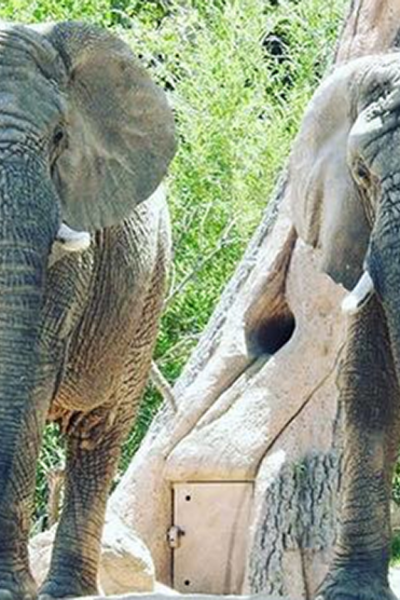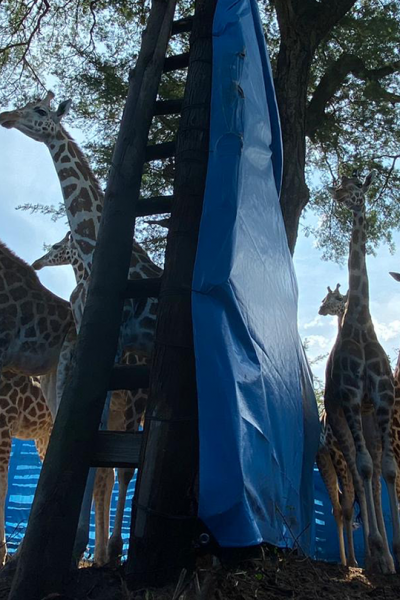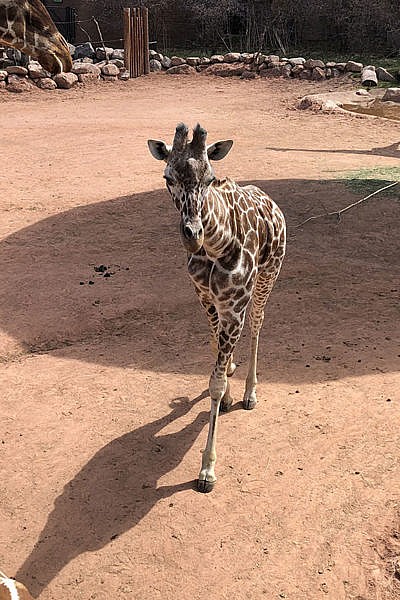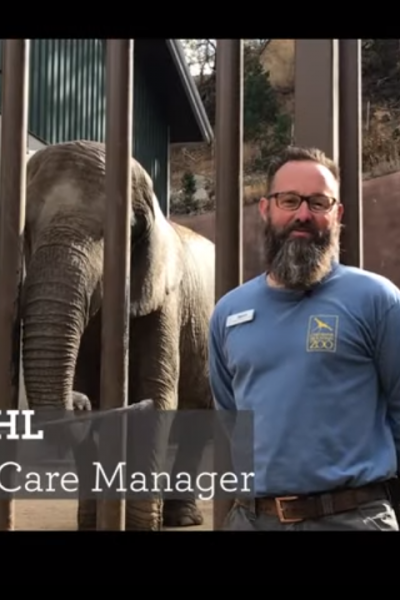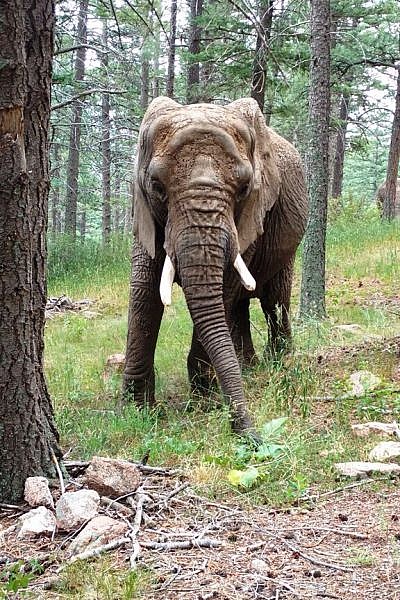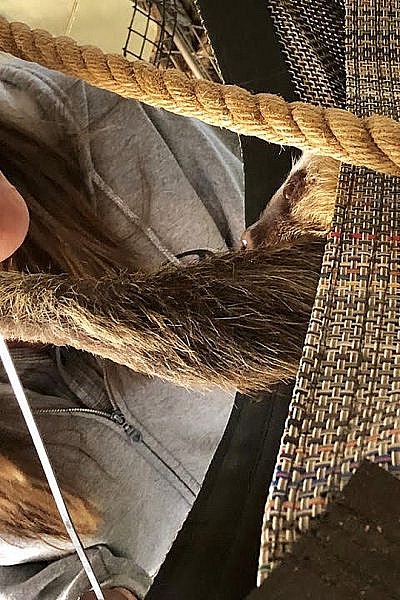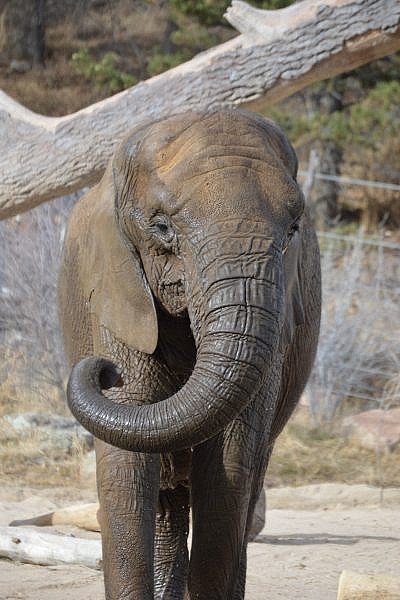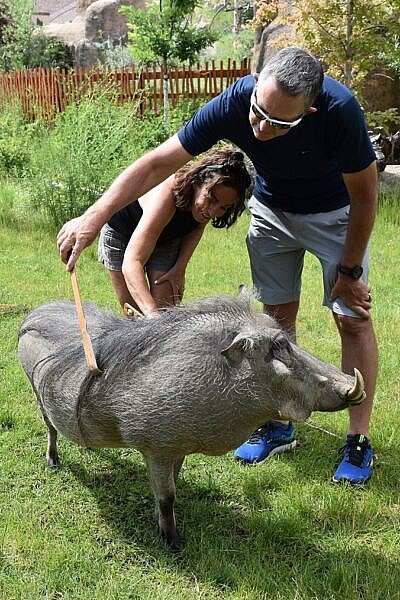
The Wilgruen Elephant Center in Encounter Africa is home to six African elephants named Jambo (37), Malaika (34), Lucky (40), LouLou (38), Kimba (42) and Missy (51). All of these precious pachyderms are considered to be advanced in age, and that’s no coincidence. Our ‘Golden Girls,’ as we affectionately call them, are the beneficiaries of a vision that CMZoo had years ago.
“We saw a need in the greater zoo community to provide a home for aging elephants,” said Dr. Liza Dadone, vice president of mission and programs. “Many zoos provide wonderful homes for young and breeding-age elephants, but weren’t specifically equipped to care for the age-related issues these massive creatures inevitably experience in their later years. We saw that as an opportunity to step up and create an environment and wellness program that could help them live their best lives in their golden years.”
The Wilgruen Elephant Center in Encounter Africa is a state-of-the-art facility designed to help address the complications that come with aging multi-ton animals that need medical assistance. Equipment includes a remote video surveillance system, a crane-and-hoist system that can lift a disabled elephant, and a care program that provides a safe area for weighing, veterinary care and husbandry training. In addition to the sand that staff bring into the barn to provide cushioning substrate, areas of the barn floors are rubberized concrete which helps ease the pressure of their impressive weight on their aging joints.
“Malaika is one of our best known elephants because of the issues she’s been able to overcome thanks to our team’s expertise and the equipment in the barn, like the crane-and-hoist system that has saved her life twice since January 2018,” said Dr. Dadone. “As she continues to navigate these issues, we work with the elephant experts at CMZoo and other organizations to try innovative ways to address them.”
On April 1, 2019, Malaika was, for the second time, found lying on her side and unable to get up during an overnight check. If an elephant can’t get up on its own and is down for too long, it can cause stress to its internal organs and can be fatal.
Some elephants are able to lie down and get back up with no problem, but some, like Malaika, don’t lie down and instead will lean on objects for rest. This is partially due to a life-long issue with bowing and lack of strength in her back right leg, which is worsening as she ages.
Both times she fell, the Zoo’s emergency response team used the barn’s hoist system to help Malaika into a sternal position (on her belly, with legs in a better position to stand). Malaika was then able to stand on her own. Since then, her care team, including her keepers and veterinary staff, monitor her for any additional medical concerns, and use innovative methods to help her rest, gain flexibility and strengthen her core muscles.
Malaika and all of the CMZoo elephants participate in daily voluntary physical therapy, which we call ‘elephant yoga.’ The routines focus on overall flexibility and strengthening while addressing any problem areas the individuals may have. For Malaika, that means working on core strength and flexibility, as well as teaching her to trust and use some of the items we give her to encourage rest.
“All of the girls participate in elephant yoga daily,” said Jason Bredahl, Encounter Africa animal care manager. “They get really excited when it’s their turn to train with their keepers. They do exercises like downward dog – or downward elephant – and do repetitions of lifting and holding their legs, heads and trunks in a stretched position for an extended period of time. Over the years, we’ve seen their flexibility improve, but some of their long-term issues continue to present challenges.”

The team also offers sand piles, large tires and boulders to Malaika and encourages her to lean against them with positive reinforcement training. Elephants are incredibly intelligent and observant, but the sand piles’ purpose isn’t an easy thing to communicate to Malaika. To encourage her to trust the sand pile’s ability to support her, the team incorporates the piles into her existing training. During her physical therapy routine, they ask her for behaviors she knows, but close to or on top of the sand. Asking Malaika to position herself with her belly on a small pile is hopefully helping her recognize the relief it can provide by taking some of her nearly 8,000 pounds of body weight off of her legs and feet.
“We’re working on building her confidence in leaning against them to rest, since she doesn’t lie down,” said Bredahl. “Since we first started working with one sand pile last fall, we have extended them into most of the barn. Part of strengthening her body to recover from or avoid a fall is also making sure she’s resting. We’ve seen some progress with her leaning against the piles, and we’re hopeful that will continue and improve. Because she has fallen twice now, we train her and ourselves to be prepared for another fall, even though we hope that doesn’t happen again.”
Zoo staff performs drills to practice and test protocols for situations like a fall. Using huge bags containing tons of sand, the team holds timed training sessions. The team springs into action as they would during a real event, engaging the hoist-and-crane system in the barn to secure the nylon lifting straps beneath the bag and raise it up, as they would with an elephant who couldn’t get up on her own. These emergency practice events help the team stay familiar with the equipment and the pressure associated with a real crisis.
Even with all of the emergency equipment and training in place, the team believes preventive care is the best way to keep the girls healthy.
“We work to provide an environment that keeps the herd moving, because just like all of us, a body in motion stays in motion,” said Bredahl. “We provide enrichment throughout every day, and we move the girls every one to two hours into a new space, which keeps them walking and provides new opportunities, interesting spaces and enrichment for them to explore.”
As well as their daily yoga, the girls get consistent exercise with a variety of spaces, both inside the barn and outside in their yards. Outdoor features include a quarter-mile walking path, built-in enrichment activities that encourage natural behaviors like stretching high and lifting heavy items such as logs, a pool big enough to swim and relax in, a waterfall and pond, mud bathing in a large mud wallow, varied terrain to keep muscles fit moving up and down hills, a training yard, and a 2-acre off-exhibit vacation yard, where the Zoo’s elephants can take a break from their duties as animal ambassadors and roam the forest – often doing their own versions of landscaping, like knocking down trees and pulling up fresh grass and branches to snack on.
Veterinary care is also a big part of elephant care. The herd participates in voluntary blood draws for diagnostics, laser therapy, tusk and foot care. Lucky has struggled with an issue in her rear right leg that causes her to ‘lock’ her knee when she walks. She is able to bend her knee – and does frequently as a focus of her customized physical therapy – but chooses to keep her leg straight the majority of time she’s exploring on her own. This causes an abnormal gait which leads to more wear on one side of her foot that her care team monitors daily. Malaika is similar to Lucky in that she wears more of her right rear foot pad due to her bowed leg.
“We work with a farrier team to create ‘shoes,’ for many of our animals, including giraffe and Malaika and Lucky,” said Dr. Dadone. “The leather shoes are adhered with a nontoxic glue and help prevent wounds to Lucky’s and Malaika’s foot. When one side of a foot gets more wear and tear, it can cause their naturally thick skin to wear down to more delicate skin, which we need to protect from potential infection and the pain they could experience from irritating that more sensitive skin.”
The shoes, treatments and physical therapy to address these issues help the elephants remain active and comfortable, but the team acknowledges that they may never be able to fully correct these issues.
“All of the elephants are monitored with daily quality-of-life markers,” said Dr. Dadone. “We look for things like appetite, activity, social interactions with the rest of the herd, how many times per day they’re bending a problem joint or not, and any indications that they’re not able to enjoy life as an elephant. The data, over time, helps us make decisions that ensure our elephants are living the fullest lives they possibly can.”
If you’ve ever visited #CMZoo and our herd of six African elephants, you can consider yourself a conservation warrior. Through our Quarters for Conservation program, 75¢ of every admission goes to conservation partners, like Tsavo Trust – a field-based non-profit organization that uses aerial surveillance and on-the-ground field efforts to protect elephants, rhinos and other wildlife in Tsavo National Park, the largest national park in Kenya. Small change makes a big difference. Since 2008, those quarters have added up to more than $3 million for conservation – a milestone the Zoo celebrated at the end of July. Tsavo Trust was founded to help protect the last of the big tuskers, which are likely the last viable genetic pool of African elephants with tusks weighing more than 100 pounds each. The park is also home to a number of black rhino sanctuaries established by the Kenya Wildlife Service (KSW) and supported by the Zoological Society of London.
